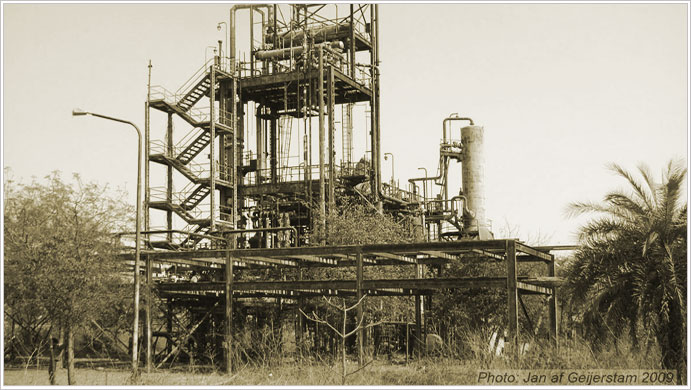 |
 |
|
||||||||||||||||
| INTRODUCTION
The Workshop will be spread over ten days and is structured along the lines of past workshops by mAAN, in Shanghai 2004 and in Padang, Indonesia 2009 (www.m-aan.org). The workshop explores methods that can be used to meet the practical and theoretical challenges of the rehabilitation of the Bhopal Tragedy Site. Experts and students in related disciplines as well as stakeholders involved with the Tragedy will engage in dialogue to produce schematic proposals addressing the overall site or key concerns related to the site. The workshop output will provide the orientation and stimulus for debate and dialogue for the following Symposium. The workshop looks at the practical challenges in rehabilitation of the Tragedy site specifically from the design, urban regeneration and heritage management perspectives. At the same time it addresses the larger social implications of architectural design and heritage conservation. In order to create a common reference different units (student groups) the workshop uses as starting point the Bhopal Gas Tragedy Memorial Master Plan proposal that was selected by the Madhya Pradesh State government in 2005 after a nation wide open design competition. Using this master plan as a point of departure, students in different units will focus on various thematic components related to rehabilitation of the site as a cultural heritage site and as a memorial space for the tragedy. 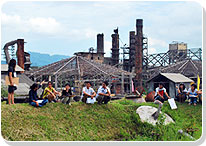 The following five themes will be explored by different units:
The following five themes will be explored by different units:
 Bhopal BhopalThe city of Bhopal is steeped in history. Its monuments, its unique culture and cuisine are a legacy of the times when this lakeside city was the capital of various princely states over centuries. Yet most people across the globe associate the Bhopal Gas Tragedy, which took place at the Union Carbide Factory plant in the outskirts of the city in December, 1984. The precinct 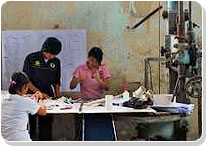 In spite of its semiotic cultural value as the physical site of the tragedy, the factory precinct today, already in a serious state of disrepair, is under constant threat of being demolished. A recent high court order for the cleanup of the site has increased the odds of this happening as the implementing agencies see the demolition of the factory as a prerequisite for decontamination of the site. This view finds support amongst those who perceive the factory precinct as a grim reminder of an unfortunate tragedy that Bhopal is best rid off. This dilemma can be placed in context of the potentially contentious role of heritage conservation in many settings where industrialisation has left behind a somewhat dubious and antipathetic legacy.
In spite of its semiotic cultural value as the physical site of the tragedy, the factory precinct today, already in a serious state of disrepair, is under constant threat of being demolished. A recent high court order for the cleanup of the site has increased the odds of this happening as the implementing agencies see the demolition of the factory as a prerequisite for decontamination of the site. This view finds support amongst those who perceive the factory precinct as a grim reminder of an unfortunate tragedy that Bhopal is best rid off. This dilemma can be placed in context of the potentially contentious role of heritage conservation in many settings where industrialisation has left behind a somewhat dubious and antipathetic legacy.
The factory 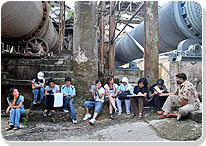 In operation since 1973 with subsequent modifications to the original design, this factory plant was magnificent structure "largest alpha-naphthol plant of this design anywhere in the world"1 surpassing the imagination and expectation of the audience. In operation since 1973 with subsequent modifications to the original design, this factory plant was magnificent structure "largest alpha-naphthol plant of this design anywhere in the world"1 surpassing the imagination and expectation of the audience.
The factory plant produced agricultural pesticide with a promise of a 'greener and better India' and used hazardous chemicals like phosgene, chlorine and methyl isocyanate that lay stocked in abundance at the site. Today, apart from some angry graffiti that one might find scribbled on its walls, there seems to be no visible link between this dilapidated structure and admittedly, the worst industrial disaster in history. Today the 67 acre industrial site lies abandoned, closed to public and under litigation for serious environmental contamination. METHODOLOGY 50 students from different disciplines from around the world will participate over 10 days in 5 different units of 10 each. Each group will be guided by two unit masters with experience and expertise in the relevant theme (Names of the unit masters will be shortly uploaded on the site). Graduate and Post graduate students from diverse fields including architecture, urban design, applied arts, conservation, development studies and heritage management backgrounds may apply. The workshop will have guest lectures by experts and a mid-term review. Units are to present their proposals in media of their choice in the Symposium following the workshop. These will be presented and discussed during the symposium that follows. Infrastructure in terms of studio space, stationery, internet and printing facilities will be provided for the students. 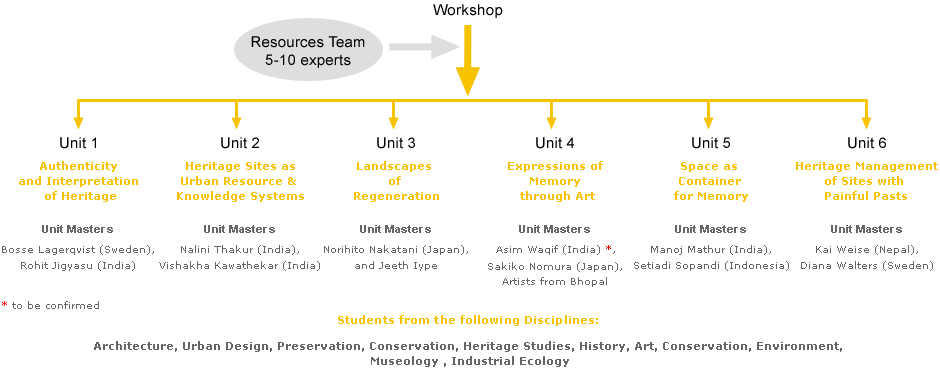 
PRECEDENCE Together with the Tongji University (Shanghai) and the Shanghai architect office of Deng Kunyan Associates, mAAN hosted a post graduate workshop aimed to produce a master plan to revitalize and transform a factory complex, gone out of business, into a grand-scale design center. The Great Shanghai Factory Revitalization Workshop(GSFRW), was a 14-day workshop, open to graduate students from all parts of Asia, held on the site of an endangered factory complex gone out of business. This program was part of the Asian Academy of Heritage Management Program of the UNESCO/Bangkok Office. The impact of the workshop then convinced the Shanghai Urban Planning authorities, as well as government authorities throughout other cities in China, the importance and value of identifying industrial heritage developments and seeking unique ways of revitalizing them within the context of their environments. For more details see: See mAAN.org EXPECTED OUTCOMES
|
| Copyright 2010 © Bhopal 2011. All rights reserved | For Feedback or comments: contact Webmaster |
|
